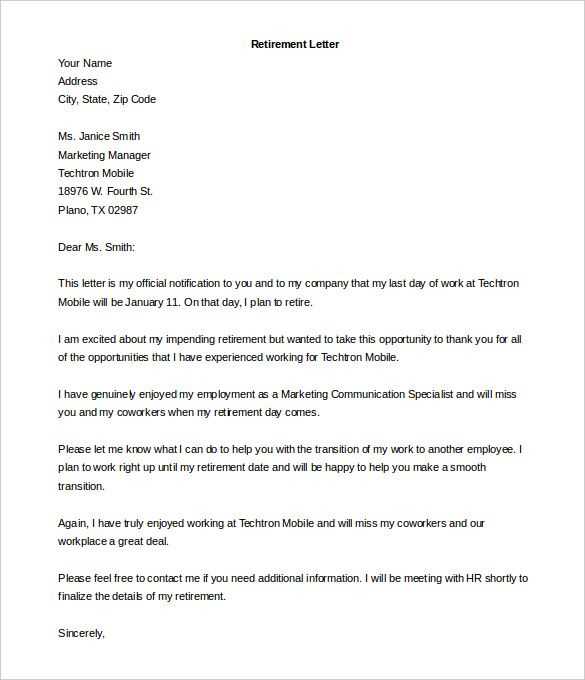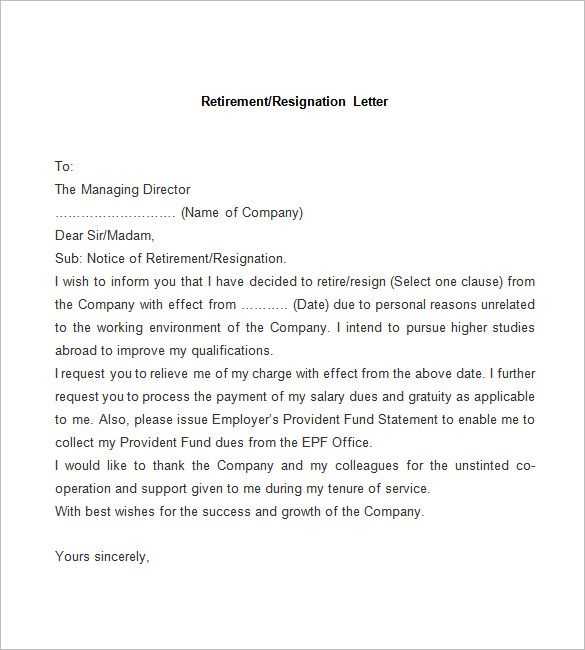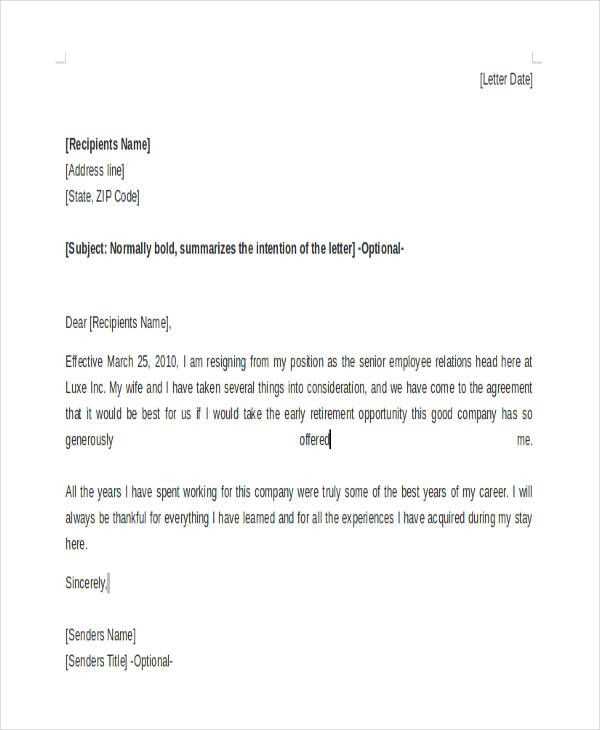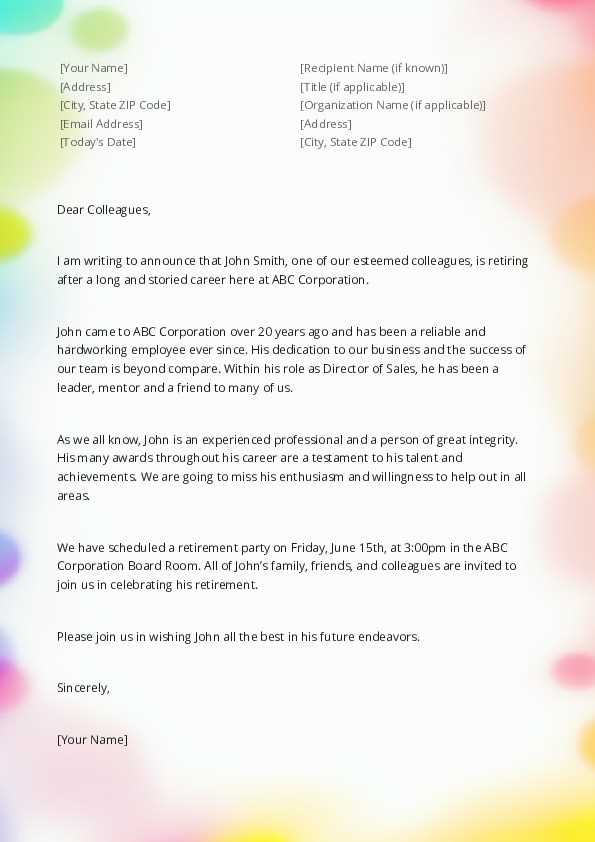Template for Writing a Retirement Letter to Employee

When the time comes for someone to leave their professional role after many years of service, expressing gratitude and appreciation through a formal written note becomes an important gesture. Such messages help ensure a smooth transition, offering well-wishes and acknowledging the contributions made during the individual’s tenure.
Creating a well-structured message can be challenging, as it should convey sincerity while maintaining professionalism. The goal is to balance warmth and respect, making the recipient feel valued without crossing the boundaries of formality. A thoughtful communication ensures that the end of the professional relationship remains positive and memorable.
By focusing on key elements such as personalization and appropriate tone, these notes can leave a lasting impression. They offer an opportunity to reflect on shared achievements, express gratitude, and acknowledge the individual’s future journey, creating a meaningful closure to their professional experience.
When crafting a formal message to bid farewell to a long-serving individual in your organization, it’s crucial to ensure that the tone is appropriate and the content reflects appreciation. The format should remain professional yet heartfelt, celebrating the individual’s contributions while wishing them success in their future endeavors.
Key Elements to Include
The structure of the message should highlight the individual’s achievements and contributions to the company, followed by expressions of gratitude. It’s also essential to mention how their departure will impact the team and the organization, acknowledging the value they brought. A closing note that wishes them well on their next chapter adds a personal touch and shows genuine care.
Personalizing the Message
Incorporating specific references to the individual’s accomplishments or moments of success within the organization adds depth to the message. Personalizing the note ensures that the individual feels appreciated and recognized for their unique contributions. Be mindful to strike the right balance between warmth and professionalism throughout the content.
Key Elements of a Retirement Message
A well-crafted farewell message serves as a token of appreciation and a recognition of an individual’s time and efforts. To ensure the message resonates with sincerity, certain components must be carefully included. These elements create a balance between professionalism and personal warmth, honoring the individual’s contribution while offering well-wishes for the future.
Essential Components

- Introduction: Start by acknowledging the purpose of the message, setting the tone of appreciation.
- Recognition of Achievements: Highlight the individual’s key contributions, accomplishments, and any lasting impact they’ve made within the organization.
- Personal Appreciation: Express gratitude for their dedication, work ethic, and the relationships they’ve built over time.
- Future Wishes: Close with heartfelt wishes for their upcoming endeavors, whether personal or professional.
Maintaining a Respectful Tone

It’s essential to ensure that the tone remains respectful throughout, offering sincere acknowledgment without becoming overly casual. Balance in language helps maintain professionalism while conveying warmth, ensuring the message is both meaningful and appropriate.
Advice for Writing a Thoughtful Letter
Crafting a meaningful message for someone leaving their position requires a balance of sincerity and professionalism. A well-composed note can express gratitude, acknowledge the person’s contributions, and offer best wishes for the future. To ensure the message is both thoughtful and appropriate, certain strategies should be kept in mind throughout the writing process.
Key Considerations
- Personalize the Content: Reference specific moments or achievements to make the message feel more genuine and tailored to the individual.
- Maintain a Positive Tone: Ensure the language used is uplifting, reflecting appreciation and respect for their time spent with the company.
- Avoid Overly Casual Language: While warmth is important, the tone should remain professional to preserve the message’s formal nature.
- Keep It Concise: A thoughtful note doesn’t need to be lengthy; focus on quality and meaningful content rather than length.
Final Touches
Before finalizing the message, review it for clarity and tone. A well-structured note with no grammatical errors or awkward phrasing will make a more lasting impression. Always aim for a heartfelt yet professional closing that reinforces appreciation and good wishes for the individual’s future.
Making the Letter More Personal
To create a more meaningful and impactful message, it’s important to infuse it with personal touches. This not only makes the recipient feel more valued but also strengthens the connection by highlighting unique aspects of their journey. Personalization demonstrates genuine appreciation and adds a thoughtful element to an otherwise formal note.
Ways to Add a Personal Touch
- Mention Specific Contributions: Highlight the individual’s specific achievements, milestones, or projects that left a lasting impact.
- Reflect on Shared Experiences: Acknowledge memorable moments or collaborations that were meaningful to both parties.
- Use Their Name Frequently: Including the individual’s name throughout the message reinforces a sense of personalization and importance.
Being Genuine
Above all, ensure the message feels authentic. Avoid using generic phrases and focus on expressing heartfelt gratitude. A sincere tone will resonate more with the recipient and show that the message was thoughtfully crafted with them in mind.
Common Mistakes in Retirement Messages
When composing a farewell note, it’s easy to make mistakes that can detract from the intended message. These errors may come across as impersonal or fail to convey the appropriate level of gratitude and respect. Understanding the common pitfalls can help ensure that the message is well-received and truly reflects appreciation for the individual’s time and efforts.
One of the biggest mistakes is using overly generic phrases that lack sincerity. Another issue arises when the tone becomes either too casual or too formal, making it feel disconnected from the relationship shared. Additionally, neglecting to acknowledge the individual’s specific contributions or achievements can make the message feel less personal and meaningful.
The Importance of Tone in Letters

The tone of a message plays a crucial role in how it is perceived by the recipient. It sets the mood and establishes the level of formality, which is essential when delivering a meaningful and respectful note. A well-chosen tone can convey appreciation, recognition, and goodwill, ensuring the individual feels valued for their contributions.
When crafting a farewell message, it is important to strike a balance. A tone that is too casual might come across as dismissive, while one that is too formal could feel distant or impersonal. Maintaining a respectful yet warm tone ensures the message feels both professional and heartfelt, leaving a positive impression.
Choosing the right tone helps in making the message more engaging and genuine. It reinforces the personal connection between both parties and reflects the sentiment of gratitude that should be conveyed during such a significant transition.
How to Conclude a Retirement Message
Ending a message on a positive and respectful note is essential to leave a lasting impression. The conclusion should encapsulate the sentiment of gratitude and best wishes, ensuring the recipient feels appreciated for their time and efforts. A well-crafted closing reinforces the message’s sincerity and adds a sense of closure to the communication.
Effective Ways to Conclude
- Express Gratitude: End with a genuine thank you for their contributions and dedication.
- Wish Them Well: Convey your best wishes for the next phase of their journey.
- Offer Continued Support: Reinforce that you are available for any future needs or assistance.
Suggested Phrases for Conclusion
| Phrase | Context |
|---|---|
| “Thank you for your dedication and hard work.” | Expressing appreciation for their effort and commitment. |
| “Wishing you all the best in your future endeavors.” | Offering well wishes for what lies ahead. |
| “Please stay in touch, and feel free to reach out.” | Encouraging ongoing communication and support. |
A thoughtful conclusion ensures the recipient feels valued and appreciated, leaving a lasting positive impression as they move on to the next chapter in their life.